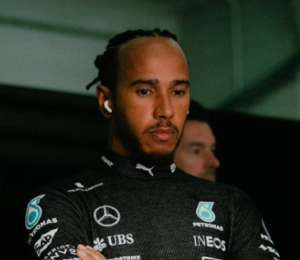Frustration at Canadian GP Qualifying, Mercedes W15’s Evolution And More
#Frustration #Canadian #Qualifying #Mercedes #W15s #Evolution
Welcome to Allsocial Updates . Get latest News related to entertainment, Education, Technology, Sports, Science , Finance at one place. Please Subscribe to our feed and Bookmark our website for all updates around the world
Lewis Hamilton, the seven-time Formula 1 world champion, is known for his exceptional driving skills and competitive spirit. However, the 2024 season has been challenging for him, particularly in qualifying sessions, where he has faced unexpected difficulties
Lewis Hamilton’s struggles in qualifying sessions are a testament to the unpredictable nature of Formula 1. Despite facing setbacks, he remains resilient and focused on overcoming challenges.
As he continues to chase success in the 2024 season, Hamilton’s determination and drive will undoubtedly inspire fans and fellow competitors alike.


Also Read: Charles Leclerc Expresses Frustration Towards Teammate Carlos Sainz for Track Incident at F1 Chinese GP Sprint and Promotion
Lewis Hamilton’s Frustration at Canadian GP Qualifying
Lewis Hamilton, a seven-time Formula 1 world champion, expressed his dissatisfaction with his qualifying performance at the 2024 F1 Canadian Grand Prix.
Despite a promising start in practice sessions, Hamilton struggled to secure a strong position in the qualifying rounds, leading to visible frustration.
Hamilton’s performance during the practice sessions at the Canadian GP showed potential for a strong qualifying session.
On Friday, he finished P4 and P7 in FP1 and FP2, respectively. These results were encouraging and set the stage for what appeared to be a competitive weekend for the Mercedes driver.
Don’t ever forget your power. Don’t ever forget your purpose. Don’t ever forget that I’m rooting for you. pic.twitter.com/yKHdD3BUPa
— Lewis Hamilton (@LewisHamilton) October 14, 2022
Topping the Charts in Final Practice
On Saturday, Hamilton’s confidence grew as he topped the charts in the third and final practice session with a fastest lap of 1:12.549.
This performance indicated that he had found a good rhythm with his Mercedes W15 and was poised for a strong showing in the qualifying rounds.
However, the qualifying session did not go as planned for Hamilton. Despite his earlier success, he only managed to secure P7. This was particularly disheartening given that his teammate, George Russell, topped the timing sheets and narrowly edged out reigning world champion Max Verstappen by an incredibly slim margin of +0.000 seconds.
The Narrow Margin of Pole Position
George Russell’s pole position was determined by the narrowest of margins. His fastest lap was clocked just before Verstappen’s, giving him the edge.
This added to Hamilton’s frustration, as he was out-qualified by his younger teammate despite his strong showing in practice.
Speaking to Canal+, Hamilton did not hold back his disappointment. He commented on how the performance of the Mercedes W15 seemed to change between practice and qualifying. “It was a tough qualifying session,” he said. “The car felt different compared to the practice sessions. It’s something we need to look into because the pace just wasn’t there when it mattered.”
The Challenge of Consistency
Hamilton’s remarks highlight a common challenge in Formula 1: maintaining consistent performance across different sessions.
While practice sessions can provide valuable data and confidence, the pressure and conditions of qualifying can sometimes reveal unexpected issues with the car’s setup or performance.
The Mercedes W15 has shown potential throughout the 2024 season, but it has also faced criticism for its inconsistencies.
Hamilton’s experience at the Canadian GP underscores the ongoing development and adjustments that the team must make to ensure the car performs optimally in all conditions.


Comparing Teammates
Hamilton and Russell’s performances at the Canadian GP offer an interesting comparison between the two Mercedes drivers.
While Hamilton has the experience and track record of a seven-time world champion, Russell’s ability to secure pole position demonstrates his growing prowess and potential as a future champion.
The Psychological Battle
In addition to the physical and technical aspects of racing, Formula 1 drivers often face psychological challenges.
- Hamilton’s frustration with his qualifying performance reflects the mental toughness required to stay focused and motivated, even when results are disappointing.
- The dynamic between Hamilton and Russell within the Mercedes team is crucial. While competition between teammates is natural, it is essential for the team’s overall success that both drivers work together and support each other.
- Hamilton’s experience and leadership, combined with Russell’s youthful energy and talent, can create a powerful synergy if managed well.
- Despite the setback in qualifying, Hamilton’s focus quickly shifted to the race itself. With his extensive experience and strategic acumen, he knows that race day offers numerous opportunities to recover and potentially secure a strong finish.
- His aim would be to leverage his skills and the team’s strategy to climb the grid.
Technical Adjustments and Strategy
Mercedes engineers and strategists play a critical role in addressing the issues identified during qualifying.
Fine-tuning the car’s setup, optimizing tire strategy, and planning pit stops are all essential components of a successful race strategy. Hamilton’s feedback will be invaluable in making these adjustments.
One of Hamilton’s defining characteristics is his relentless determination. Even when faced with setbacks, he remains focused on the ultimate goal of winning races and championships.
This resilience has been a key factor in his success over the years and will undoubtedly drive him as he prepares for the Canadian GP race.
The Broader Context of the 2024 Season
Hamilton’s qualifying performance at the Canadian GP should be viewed within the broader context of the 2024 season.
While individual sessions and races are important, the ultimate objective is to accumulate points and maintain a strong position in the championship standings. Each race is a building block towards this goal.
Hamilton’s global fan base has high expectations for him at every race. Their support and enthusiasm provide motivation, but also add pressure.
Hamilton’s ability to manage these expectations and maintain his focus on the task at hand is crucial to his success.


Also Read: Guenther Steiner: New Job, Departure from Haas F1 Team, Bio, Net Worth 2024 and More
Lewis Hamilton: Media and Public Reaction
The media and public reaction to Hamilton’s qualifying performance varied.
While some expressed concern over the apparent dip in form, others emphasized the unpredictability of Formula 1 and the potential for Hamilton to turn things around in the race.
Such reactions are part and parcel of a high-profile career in motorsport.
Hamilton often reflects on his past successes to stay motivated. His seven world championships are a testament to his skill and tenacity.
Drawing on these experiences helps him navigate the ups and downs of each season, including challenging qualifying sessions.
The Importance of Teamwork
Hamilton’s relationship with his team is critical. Effective communication and collaboration between the driver, engineers, and strategists ensure that everyone is working towards the same goal.
This teamwork is essential for identifying and addressing issues, as seen in the Canadian GP qualifying session.
Setbacks are an inevitable part of any sport, and Hamilton views them as learning opportunities. Analyzing what went wrong in qualifying and making the necessary adjustments can lead to better performance in future sessions. This mindset of continuous improvement is vital for long-term success.
The Race Day Plan
- As Hamilton prepares for race day, his plan will involve a combination of aggressive driving, strategic overtakes, and efficient pit stops.
- His goal will be to maximize his position and capitalize on any opportunities that arise during the race, demonstrating his racing intelligence and experience.
- Lewis Hamilton’s frustration with his qualifying performance at the 2024 Canadian GP highlights the challenges and complexities of Formula 1 racing.
- Despite a strong showing in practice, his dip in performance during qualifying serves as a reminder of the unpredictable nature of the sport.
- Hamilton’s response to this setback, characterized by his determination and focus, will be crucial as he aims to recover and perform well in the race.
- With the support of his team and his own resilience, Hamilton remains a formidable competitor, ready to tackle the challenges of the Canadian GP and the remainder of the 2024 season.


Lewis Hamilton: Mercedes W15’s Evolution
Lewis Hamilton, the seven-time Formula 1 World Champion, recently spoke about the significant improvements in the Mercedes W15 car as the team prepared for the Canadian Grand Prix.
Since the start of the 2024 season, Mercedes has been determined to close the performance gap between themselves and leading teams like Ferrari, McLaren, and Red Bull.
This pursuit led to a substantial upgrade package aimed at enhancing the W15’s front suspension, which Hamilton praised during an FIA press conference.
The Upgrade Package: Enhancing the Front Suspension
The most notable upgrade to the W15 is the re-engineered front suspension. This major modification is designed to lower the car’s ride height, which has a direct impact on handling and overall performance.
By lowering the center of gravity, the W15 can achieve better stability and control, especially in high-speed corners. This change has been crucial in improving the ride quality, which Hamilton discussed extensively.
Improved Ride Quality: A Driver’s Perspective
Hamilton highlighted the improved ride quality of the Mercedes W15, attributing it to the new front suspension. He explained how the decreased height allows for better weight distribution and more precise control.
This upgrade has made the car more responsive and easier to handle, particularly on tracks with complex cornering sequences. The changes have allowed Hamilton to push the car closer to its limits, providing a more competitive edge.
Cornering Dynamics: Strengths and Weaknesses
Despite the improvements, Hamilton also pointed out areas where the W15 still lacks performance. He noted that while the car’s handling in corners has significantly improved, there are still some challenges to overcome. For instance, the W15 sometimes struggles with understeer in tight corners, which affects its lap times.
Hamilton emphasized the need for continued development to address these issues and optimize the car’s performance across all types of tracks.
Closing the Gap with Top Teams
Mercedes’ efforts to close the gap with top teams have been relentless. The upgrade package is part of a broader strategy to enhance the car’s competitiveness. Hamilton expressed confidence in the team’s ability to continue making progress.
He acknowledged that while the improvements have brought them closer to Ferrari, McLaren, and Red Bull, there is still work to be done to consistently challenge for race wins and podium finishes.
The Role of Aerodynamics
In addition to the suspension upgrades, Mercedes has also focused on aerodynamic enhancements. The team has been experimenting with various aerodynamic setups to find the optimal balance between downforce and drag.
Hamilton mentioned that these changes have contributed to the car’s improved performance, particularly on tracks with long straights and high-speed corners.
Feedback Loop: Driver and Engineering Collaboration
The collaboration between Hamilton and the engineering team has been pivotal in driving the W15’s development. Hamilton’s feedback on the car’s performance is invaluable for the engineers, who use this information to make data-driven adjustments.
This feedback loop ensures that the car evolves in a way that aligns with the driver’s needs and the demands of different circuits.
Challenges Ahead: The Road to Consistency
Despite the positive strides, Hamilton is aware of the challenges that lie ahead. Achieving consistency in performance across all race weekends is a formidable task.
The team must continue to refine the car’s setup and address any remaining weaknesses. Hamilton’s experience and insights will be crucial in guiding these efforts and ensuring that the W15 can compete at the highest level.
The Canadian GP: Testing Ground for Upgrades
The Canadian Grand Prix serves as an important testing ground for the W15’s upgrades. The circuit’s unique combination of long straights and tight corners will put the car’s new suspension and aerodynamic features to the test.
Hamilton expressed optimism about the car’s potential performance, but he also stressed the importance of remaining focused and adaptive throughout the race weekend.


The Team’s Spirit and Dedication
Hamilton took the opportunity to praise the Mercedes team for their hard work and dedication. He highlighted the collective effort that goes into developing and optimizing the car.
From the engineers and mechanics to the strategists and support staff, everyone plays a crucial role in the team’s success. Hamilton’s acknowledgment of their contributions reflects the strong team spirit that drives Mercedes forward.
Looking Forward: The Season Ahead
As the 2024 season progresses, Hamilton and Mercedes remain committed to their goal of returning to the top of the podium.
The recent upgrades are a step in the right direction, but the journey is far from over. Hamilton emphasized the importance of continuous improvement and staying ahead of the competition.
The team will need to remain agile and innovative to maintain their upward trajectory.
The Importance of Adaptability
- Adaptability is key in the fast-paced world of Formula 1. Hamilton noted that the ability to quickly respond to changes and new challenges is crucial for success.
- The team’s willingness to experiment with different setups and strategies will be vital in their quest to regain dominance. Hamilton’s adaptability as a driver also plays a significant role in maximizing the car’s performance.
- Hamilton also mentioned the unwavering support from fans as a source of motivation. The enthusiasm and encouragement from the global fanbase inspire the team to push harder and strive for excellence.
- Hamilton’s connection with the fans is a driving force behind his determination to succeed and bring glory to Mercedes.
Also Read: Who Is F1 Debutant Liam Lawson? Replacement of Daniel Ricciardo for AlphaTauri at the Dutch Grand Prix
